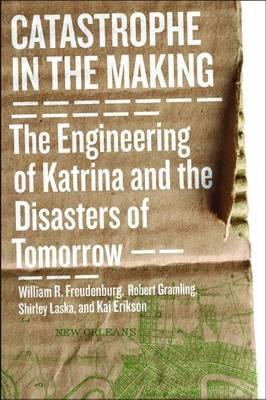Overview
'This masterpiece of scholarship breaks through a clutter of explanations of Hurricane Katrina . . . Freudenburg and his colleagues ground their analysis in an enduring sociological concept of the `growth machine’ . . . to advance their argument of humans’ biting nature. Essential. Highly recommended.' — Choice 'The best account yet of why the levees failed. The authors also warn of more disasters to come if politicians and government agencies continue to promote huge engineering projects along unstable coastlines.' — Former Secretary of the Interior, Bruce Babbitt
Full Product Details
Author: William R. Freudenburg ,
Robert B. Gramling ,
Shirley Laska ,
Kai Erikson
Publisher: Island Press
Imprint: Island Press
Dimensions:
Width: 15.30cm
, Height: 1.50cm
, Length: 22.90cm
Weight: 0.318kg
ISBN: 9781610911634
ISBN 10: 1610911636
Pages: 224
Publication Date: 08 August 2011
Audience:
General/trade
,
General
Format: Paperback
Publisher's Status: Out of Stock Indefinitely
Availability: In Print

Limited stock is available. It will be ordered for you and shipped pending supplier's limited stock.
Reviews
This brilliant work demonstrates once again that most 'natural' disasters are in fact man-made, and therefore preventable and correctable. Bravo! --James F. Short Professor Emeritus, Washington State University The best account yet of why the levees failed. The authors also warn of more disasters to come if politicians and government agencies continue to promote huge engineering projects along unstable coastlines. --Bruce Babbitt former secretary of the Interior Fabulous. I am amazed at the quality of writing--it often left me breathless--and the depth of analysis. This penetrating and engaging book is essential for understanding the many catastrophes that stem from ignoring nature in our quest for economic growth. --Charles Perrow Professor Emeritus, Yale and author of Normal Accidents From backgrounds primarily in sociology or environmental studies, the authors do an excellent job explaining their treatise, providing a comprehensive background on the hurricane itself--how and why it formed, the physical processes at work, and how once the storm passed the disaster started. Discussing deeper stories not widely reported in the media, they highlight the heroics of the 'Cajun Flotilla' and other inventive survivors, and create a backdrop for a better understanding of the human cost associated with the storm and subsequent tragedy. --Environmental Health Perspectives This masterpiece of scholarship breaks through a clutter of explanations of Hurricane Katrina...Freudenburg and his colleagues ground their analysis in an enduring sociological concept of the 'growth machine'... to advance their argument of humans' biting nature...Essential...Highly recommended. --CHOICE
Fabulous. I am amazed at the quality of writing it often left me breathless and the depth of analysis. This penetrating and engaging book is essential for understanding the many catastrophes that stem from ignoring nature in our quest for economic growth. --Charles Perrow Professor Emeritus, Yale and author of Normal Accidents
Fabulous. I am amazed at the quality of writing--it often left me breathless--and the depth of analysis. This penetrating and engaging book is essential for understanding the many catastrophes that stem from ignoring nature in our quest for economic growth. --Charles Perrow Professor Emeritus, Yale and author of Normal Accidents
Author Information
William R. Freudenburg is professor of Environmental Studies at the University of California, Santa Barbara. Robert Gramling is professor of Sociology and director of the Center for Socioeconomic Research at the University of Louisiana at Layayette. Shirley Laska is a professor of Sociology at the University of New Orleans and director of the Center for Hazards, Assessment, Response and Technology (CHART). Kai Erikson is professor emeritus of Sociology and American Studies at Yale University.




